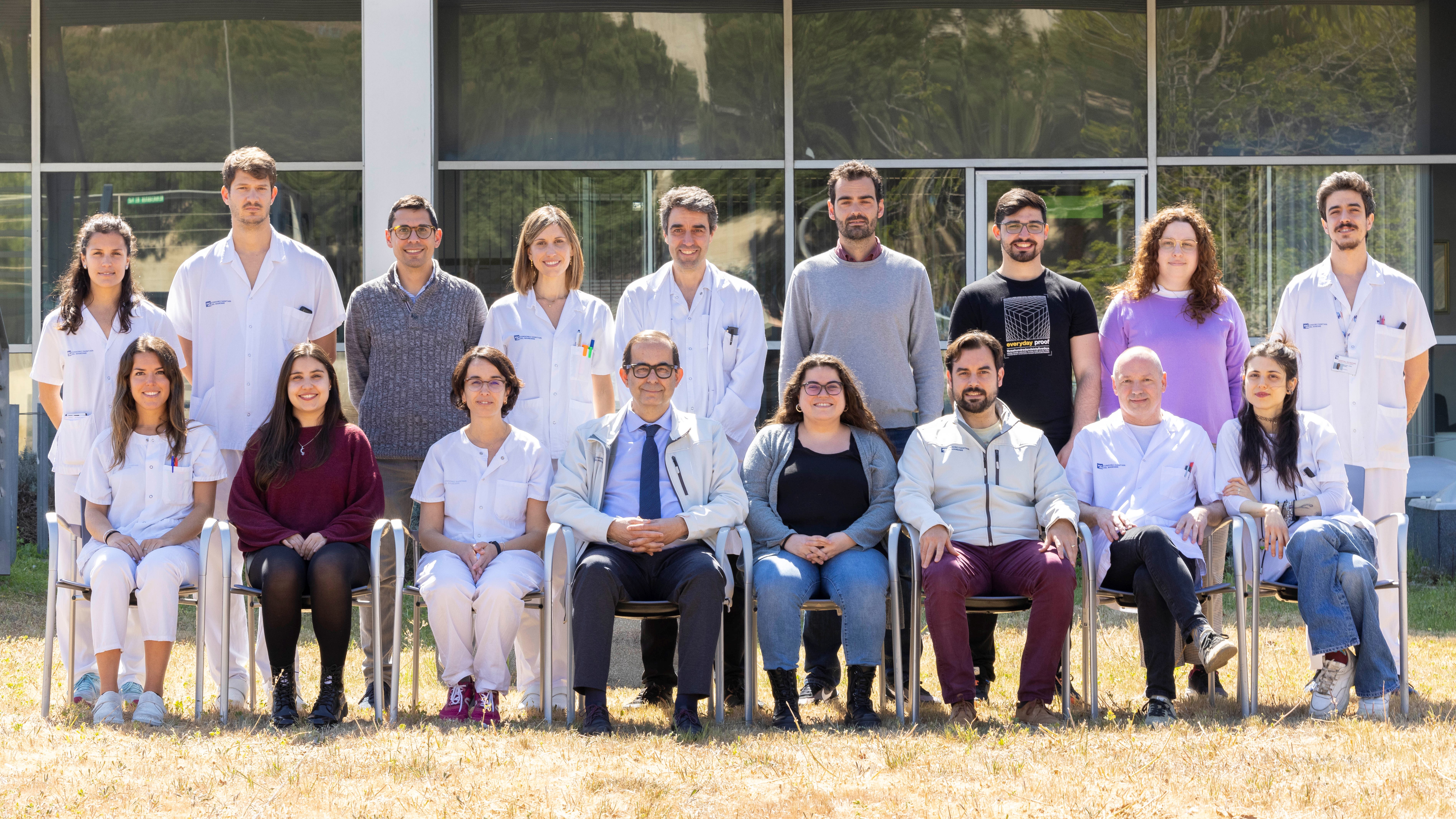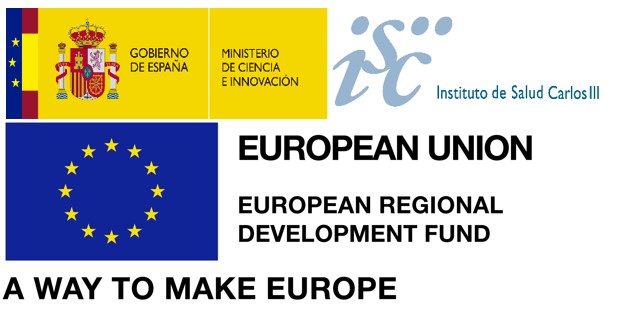About
The Neurogastroenterology and Motility research group is made up of senior researchers, postdoctoral researchers and fellows from the Hospital de Mataró. It is a part of the Research Consortium Ciberehd (Spanish Ministry of Science) since 2007 (CB06/04/1087).
The goal of the group is to study the physiology of gastrointestinal motility and the pathophysiology of diseases associated with alterations of gastrointestinal motility, which are prevalent diseases with a high impact on health and quality of life of the population. The group combines basic and clinical researchers organised around the Mataró General Hospital and the Department of Physiology at the Autonomous University of Barcelona (UAB) and translates its research activity into clinical practice (Clinical Guidelines and Position Statements).
The group has been recognised and funded by the Agency Gestió d'Ajuts Universitaris i de Recerca and CIBEREHD (CIBERehd CB06/04/1087) Grupo de Investigación para el estudio de la motilidad intestinal, 2009 SGR708 / 2014 SGR789 / 2017 SGR772 / 2021 SGR/01344, AGAUR, of the Government of Catalonia. Pere Clavé ORCID: 0000-0002-0696-8560; Omar Ortega ORCID: 0000-0001-6178-3748.
Keywords: Swallowing disorders, Oropharyngeal dysphagia, aging, stroke.

Team
Noemí Tomsen Ferré(ELIMINAR)
Mireia Bolívar Prados(ELIMINAR)
Alberto Martín Martínez(ELIMINAR)
Paula Viñas Beumala(ELIMINAR)
Kovan Mohammed Ismael(ELIMINAR)
Viridiana Arreola García(ELIMINAR)
Weslania Nascimento(ELIMINAR)
Jaume Miró Ramos(ELIMINAR)
Cristina Amadó Ruiz(ELIMINAR)
Nicolau Guanyabens Buscà(ELIMINAR)
Marta Álvarez Larruy(ELIMINAR)
Ernest Palomeras Soler(ELIMINAR)
Desiree Muriana Batiste(ELIMINAR)
Pilar Sanz Cartagena(ELIMINAR)
Alícia Costa Izurdiaga(ELIMINAR)
Christopher Cabib(ELIMINAR)
Antonio Cano Orgaz(ELIMINAR)
Vicky Casado Ruiz(ELIMINAR)
Romina Escobar Cevoli(ELIMINAR)
Stephanie Riera Nuñez(ELIMINAR)
Sergio Marín Rubio(ELIMINAR)
Ricard Farré Marti(ELIMINAR)
Lluís Mundet Pons(ELIMINAR)
Silvia Carrión Bolorino(ELIMINAR)
Miguel Martínez Guillén(ELIMINAR)
Alba Raventós Villalba(ELIMINAR)
Daniel Españó López(ELIMINAR)
Ana Morcillo Olmedo(ELIMINAR)
Research lines
Oropharyngeal dysphagia, pathophysiology, neurophysiology and new treatments
PIs: Pere Clavé, Omar Ortega
Oropharyngeal dysphagia (OD) is a common swallowing disorder that affects > 50% of older hospitalized patients and those who have suffered stroke or other neurological illnesses. OD causes severe nutritional and respiratory complications. Despite this, OD is underestimated and little diagnosed, there is currently no specific pharmacological treatment because the potential therapeutic targets are unknown. Our objective is to better understand its pathophysiology, specially the brain swallowing network, in order to develop neurohabilitation strategies with pharmacological stimulation, electrical intrapharyngeal or transcutaneous stimulation, transcranial magnetic stimulation (rTMS) and electrical transcranial stimulation (tDCS) to move from compensation to the recovery of swallowing function.
Oropharyngeal dysphagia, complications and compensatory interventions
PIs: Pere Clavé, Omar Ortega
OD can cause 2 groups of severe complications with high impact on the health and quality of life of patients: a) If there is impaired efficacy of swallow, the patient will present malnutrition and/or dehydration; up to 50% of institutionalized elderly people are poorly nourished; b) If there is impaired safety of swallow tracheobronchial aspiration occurs, this can cause pneumonia in 50% of cases with an associated mortality of 50%. Our main aim is to study the risk factors for these complications and to develop protocols to reduce their incidence by using minimal-massive strategies based on compensation (fluid and diet adaptation, nutritional supplementation and oral hygiene). In addition, we aim to characterize in a rheological and textural way these kinds of interventions and to perform basic studies on rheology and food texture.
TRP receptors and pharmacological treatment of oropharyngeal dysphagia
Neurorehabilitation, rTMS, tDCS, neuroplasticity
Gastro-oesophageal motility
PIs: Pere Clavé, Silvia Carrión
The aim of this research line is to better know oesophageal and gastro-intestinal and vesical motility in order to discover its relation to appetite control in different population groups such as the robust and frail elderly, obese individuals and obese individuals who have undergone bariatric surgery. Specifically this focusses on understanding if there are alterations in gastrointestinal motility or the neuro-hormonal system which regulates appetite and sating, studying the alterations in gastrointestinal motility and neuro-hormonal appetite control in obese individuals, studying the modifications brought about in gastro-intestinal motility by restrictive bariatric surgery in obese individuals and the associated hormone alterations.
Basic studies
PI: Pere Clavé / Noemí Tomsen
The aim is to describe the basic process involved in all the gastrointestinal disorders studied in our lab, focused on: In vitro gastrointestinal motility studies using organ bath to establish the motility alterations at the neurotransmission/muscular levels, which occur at different disease stages and as a result of interactions with immune cells, and to evaluate new therapeutic targets; Localization and quantification of TRP and ASIC receptors in human oropharynx samples, using RT-qPCR, immunohistochemistry and Western Blot. The aim is to develop active treatments to rehabilitate the swallowing function; Quantification SP and CGRP in blood and saliva using ELISA in order to describe peripheral biomarkers of pharyngeal sensory impairment and response capacity to neurostimulation treatments.
Digestive and anorectal motility disorders
Pelvic floor pathology
Active projects
Treatment of post-stroke oropharyngeal dysphagia with paired stimulation through peripheral TRVP1 agonists and non-invasive brain stimulation
PI: Pere Clavé, Omar Ortega
Funding agency: Instituto de Salud Carlos III (ISCIII)
Agency code: ICI20/00117
Start date: 2020
End date: 2024

Implantació d'un protocol d'innovació assistencial pel maneig de disfàgia orofaríngea: cribatge sistemàtic i protocol·lització del tractament compensatori
PI: Pere Clavé
Funding agency: Servei Català de la Salut
Start date: 2022
End date: 2025
Efectos biomecanicos, neurofisiologicos y clinicos de 6 meses de estimulacion con agonistas TRPV1 y TRPA1 en pacientes ancianos con disfagia orofaríngea
PI: Pere Clavé, Omar Ortega
Funding agency: Instituto de Salud Carlos III (ISCIII)
Agency code: PI22/01101
Grup de Recerca en Disfàgia Orofaríngia i Neurogastroenterologia (DYSPOD). SGR consolidated group
PI: Pere Clavé
Funding agency: Agència de Gestió d'Ajuts Universitaris i de Recerca (AGAUR) - Generalitat de Catalunya
Agency code: 2021 SGR 01344
Efecto subagudo de la estimulación sensorial farmacológica de la orofaringe mediante agonistas de los receptores TRP en la neurofisiología de la deglución en ancianos con disfagia orofaríngea
PI: Pere Clavé, Omar Ortega
Funding agency: Instituto de Salud Carlos III (ISCIII)
Agency code: PI18/00241
Start date: 2018
End date: 2022

AIMS-OD, a systematic screening for oropharyngeal dysphagia in hospitals using Artificial Intelligence
PI: Alberto Martín
Funding agency: Agència de Gestió d'Ajuts Universitaris i de Recerca (AGAUR) - Generalitat de Catalunya
Agency code: 2021 PROD 00193
Start date: 2022
End date: 2024
The Territorial Competitiveness Specialization Project (PECT) of Mataro-Maresme
PI: Alberto Martín
Funding agency: Generalitat de Catalunya within the framework of the European Regional Developments Funds of Catalonia Operational Programme 2019-2024
Agency code: PRE/161/2019
Scientific publications
Arco S, Saldaña E, Serra-Prat M, Palomera E, Ribas Y, Font S, Clavé P, Mundet L. Functional Constipation in Older Adults: Prevalence, Clinical Symptoms and Subtypes, Association with Frailty, and Impact on Quality of Life. Gerontology. 2022;68(4):397-406. DOI: 10.1159/000517212.
Tomsen N, Ortega O, Nascimento W, Carrión S, Clavé P. Oropharyngeal Dysphagia in Older People is Associated with Reduced Pharyngeal Sensitivity and Low Substance P and CGRP Concentration in Saliva. Dysphagia. 2022 Feb;37(1):48-57. DOI: 10.1007/s00455-021-10248-w.
Spronk PE, Spronk LEJ, Egerod I, McGaughey J, McRae J, Rose L, Brodsky MB; DICE study investigators. Dysphagia in Intensive Care Evaluation (DICE): An International Cross-Sectional Survey. Dysphagia. 2022 Dec;37(6):1451-1460. DOI: 10.1007/s00455-021-10389-y.
Cosentino G, Avenali M, Schindler A, Pizzorni N, Montomoli C, Abbruzzese G, Antonini A, Barbiera F, Benazzo M, Benarroch EE, Bertino G, Cereda E, Clavè P, Cortelli P, Eleopra R, Ferrari C, Hamdy S, Huckabee ML, Lopiano L, Marchese Ragona R, Masiero S, Michou E, Occhini A, Pacchetti C, Pfeiffer RF, Restivo DA, Rondanelli M, Ruoppolo G, Sandrini G, Schapira AHV, Stocchi F, Tolosa E, Valentino F, Zamboni M, Zangaglia R, Zappia M, Tassorelli C, Alfonsi E. A multinational consensus on dysphagia in Parkinson's disease: screening, diagnosis and prognostic value. J Neurol. 2022 Mar;269(3):1335-1352. DOI: 10.1007/s00415-021-10739-8.
Marin S, Serra-Prat M, Ortega O, Clavé P. Economic evaluations of health care interventions in oropharyngeal dysphagia after stroke: protocol for a systematic review. Syst Rev. 2022 May 14;11(1):92. DOI: 10.1186/s13643-022-01969-6.
Viñas P, Bolivar-Prados M, Tomsen N, Costa A, Marin S, Riera SA, Barcons N, Clavé P. The Hydration Status of Adult Patients with Oropharyngeal Dysphagia and the Effect of Thickened Fluid Therapy on Fluid Intake and Hydration: Results of Two Parallel Systematic and Scoping Reviews. Nutrients. 2022 Jun 16;14(12):2497. DOI: 10.3390/nu14122497.
Baixauli R, Bolivar-Prados M, Ismael-Mohammed K, Clavé P, Tárrega A, Laguna L. Characterization of Dysphagia Thickeners Using Texture Analysis-What Information Can Be Useful? Gels. 2022 Jul 9;8(7):430. DOI: 10.3390/gels8070430.
Guanyabens N, Cabib C, Ungueti A, Duh M, Arreola V, Palomeras E, Fernández MT, Nascimento W, Clavé P, Ortega O. The Impact of Periventricular Leukoaraiosis in Post-stroke Oropharyngeal Dysphagia: A Swallowing Biomechanics and MRI-Based Study. Dysphagia. 2023 Jun;38(3):856-865. DOI: 10.1007/s00455-022-10509-2.
Tomsen N, Ortega O, Alvarez-Berdugo D, Rofes L, Clavé P. A Comparative Study on the Effect of Acute Pharyngeal Stimulation with TRP Agonists on the Biomechanics and Neurophysiology of Swallow Response in Patients with Oropharyngeal Dysphagia. Int J Mol Sci. 2022 Sep 15;23(18):10773. DOI: 10.3390/ijms231810773.
Viñas P, Martín-Martínez A, Alarcón C, Riera SA, Miró J, Amadó C, Clavé P, Ortega O. A Comparative Study between the Three Waves of the Pandemic on the Prevalence of Oropharyngeal Dysphagia and Malnutrition among Hospitalized Patients with COVID-19. Nutrients. 2022 Sep 16;14(18):3826. DOI: 10.3390/nu14183826.
Arendt-Nielsen L, Carstens E, Proctor G, Boucher Y, Clavé P, Albin Nielsen K, Nielsen TA, Reeh PW. The Role of TRP Channels in Nicotinic Provoked Pain and Irritation from the Oral Cavity and Throat: Translating Animal Data to Humans. Nicotine Tob Res. 2022 Nov 12;24(12):1849-1860. DOI: 10.1093/ntr/ntac054.
Bolivar-Prados M, Tomsen N, Hayakawa Y, Kawakami S, Miyaji K, Kayashita J, Clavé P. Proposal for a Standard Protocol to Assess the Rheological Behavior of Thickening Products for Oropharyngeal Dysphagia. Nutrients. 2022 Nov 25;14(23):5028. DOI: 10.3390/nu14235028.
Martin-Martinez A, Ortega O, Viñas P, Arreola V, Nascimento W, Costa A, Riera SA, Alarcón C, Clavé P. COVID-19 is associated with oropharyngeal dysphagia and malnutrition in hospitalized patients during the spring 2020 wave of the pandemic. Clin Nutr. 2022 Dec;41(12):2996-3006. DOI: 10.1016/j.clnu.2021.06.010.
Martin-Martinez A, Miró J, Amadó C, Ruz F, Ruiz A, Ortega O, Clavé P. A Systematic and Universal Artificial Intelligence Screening Method for Oropharyngeal Dysphagia: Improving Diagnosis Through Risk Management. Dysphagia. 2022 Dec 28. DOI: 10.1007/s00455-022-10547-w.
Additional information
AIMS-OD (Spin-off): Our research group has built the Spin-off Artificial Intelligence Massive Screening - Medical S.L. (AIMS-Medical) on April 22, 2022 in Barcelona (B10622793). The registered office is Av. Ernest Lluch, 32 - 08302 Mataró (Barcelona). It is the first Spin-off of the Consorci Sanitari del Maresme, created to carry out the technology transfer of the Artificial Intelligence Massive Screening - Oropharyngeal Dysphagia (AIMS-OD) project, with patent number P201931028 (OEPM) and PCT (PCT/ES2020/070723). https://aimsmedical.ai/
Contact
Pere Clavé
(34) 93 741 77 00 extn 1046
More links
Consorci Sanitari del Maresme · Follow Pere Clavé on Twitter

